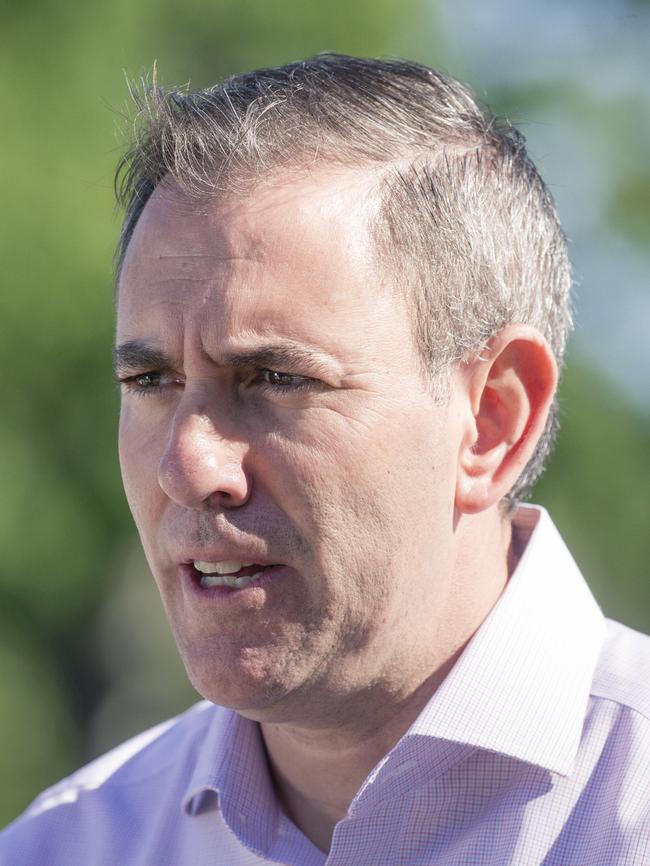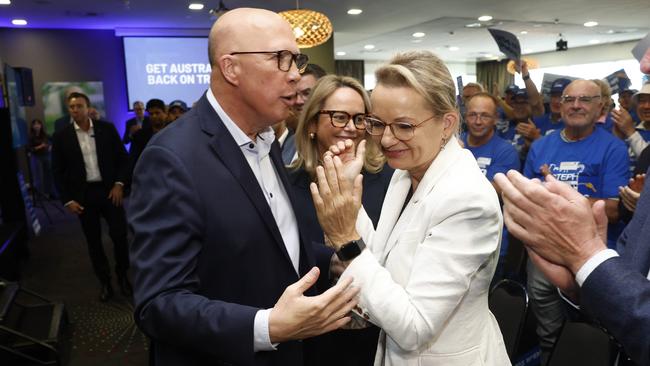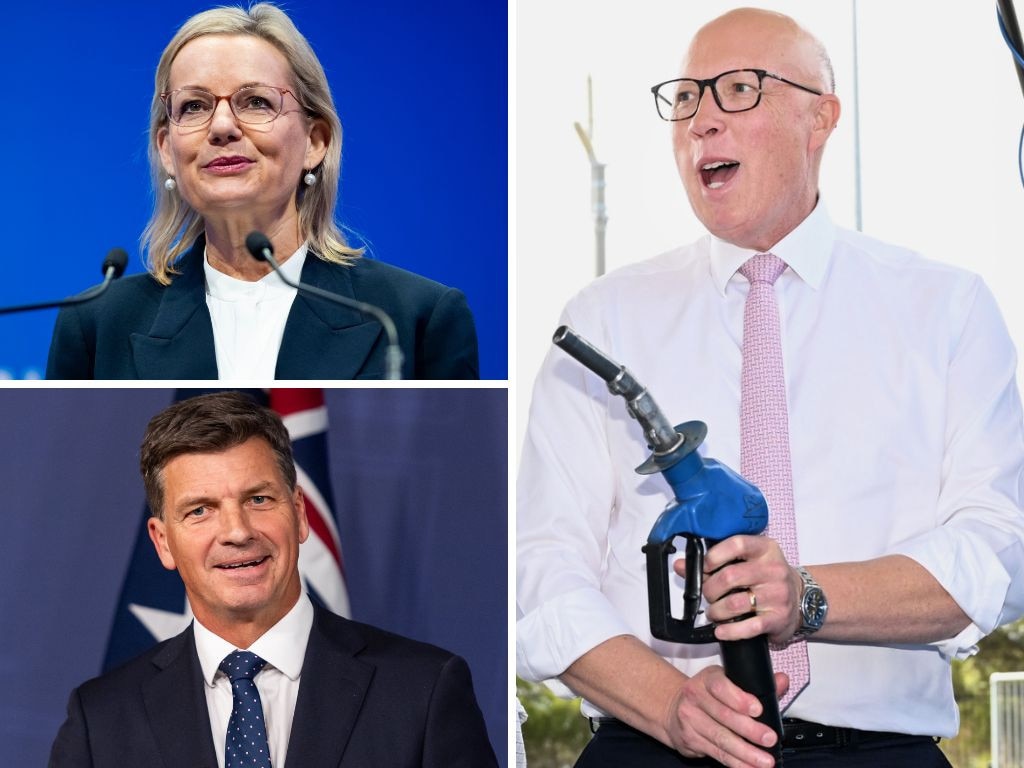Albanese supremacy: History-making Prime Minister’s ‘steady’ mandate
Anthony Albanese will prioritise crucial visits to Jakarta and Washington amid global uncertainty after a thumping election victory gifted him powerful authority inside a second-term Labor government and decimated Peter Dutton’s Liberal Party.

Anthony Albanese will prioritise crucial visits to Jakarta and Washington amid global uncertainty after a thumping election victory gifted him powerful authority inside a second-term Labor government and decimated Peter Dutton’s Liberal Party.
As Coalition MPs wait for the final count following Saturday night’s devastating result before deciding who replaces Mr Dutton after he lost his marginal seat of Dickson, The Australian can reveal the Prime Minister will immediately focus on bedding down election commitments, lifting sluggish productivity and guiding the nation through international turmoil.
After leading Labor to its best two-party-preferred result since the end of World War II at 55 per cent to 45 per cent, Mr Albanese pushed back against suggestions he would unleash a radical agenda.
“We will be a disciplined, orderly government in our second term, just like we have been in our first. The Australian people voted for unity rather than division,” Mr Albanese said during a coffee shop visit in his inner-Sydney electorate of Grayndler.
Mr Albanese, who is expected to attend an ASEAN summit in Malaysia within weeks, will prioritise early overseas trips to the US and Indonesia. A visit to the White House could coincide with a mooted mid-June trip to Canada for a G7 summit.
The 62-year-old on Sunday would not say when he would visit US President Donald Trump to discuss the countries’ trade, economic and security ties, despite Labor sources warning a major challenge for the second-term government would be navigating the global trade war and broader impacts on China, which is Australia’s major trading partner.
Despite thrashing the Coalition, with Labor on track to win at least 87 of 150 seats, senior ALP figures said Mr Albanese was cognisant of the fate of former Queensland premier Campbell Newman when he went beyond his election commitments after winning 78 of 89 seats at the 2012 state election.
As Liberal MPs were left in shock following the heavy defeat, bloodletting inside the Coalition began on Saturday night ahead of an expected leadership vote following final counts in all seats.
Liberal and Nationals strategists are hopeful of falling over the line in neck-and-neck contests with Labor and Climate 200-backed teal independent candidates and moving their total number of seats above 40.
With the Coalition facing a major rebuild that some MPs fear could take a decade, buoyant trade union leaders pushed the re-elected Labor government to use its increased majority and unleash another wave of industrial relations changes, including scrapping junior pay rates for more than 500,000 workers across the retail, fast-food and pharmacy sectors.
Union chiefs, who are pushing for a universal long-service portable entitlements scheme, have also nominated the expansion of the gig worker minimum standards to freelancers and the expansion of the National Employment Standards to insert 10 days’ reproductive leave as priorities.
Jim Chalmers on Sunday declared the US-China trade war was a “dark shadow” over the global and Australian economies.

“We know that the direct impact on us from the tariffs is manageable and relatively modest, but there is a huge downside risk in the global economy,” Dr Chalmers told the ABC.
“I think what’s happening, particularly between the US and China, does cast a dark shadow over the global economy, and we’re not uniquely impacted by that, but we’re really well placed, we are quite well prepared because of the progress that Australians made over the course of the last three years.”
Energy and mining bosses urged Mr Albanese to bring an end to power rebates and use the loss of Greens seats in the House of Representatives to accelerate reform in the gas market.
Major Australian corporates, including Rio Tinto, Wesfarmers, NAB and Alinta, also demanded Labor use its crushing election win to boost productivity and improve the lives of Australians amid ongoing concerns a global trade war threatens momentum in the nation’s economy.
Wesfarmers chief executive Rob Scott said Labor’s increased majority meant the Prime Minister must now deliver more ambitious change to improve productivity and improve standard of living.
The Australian understands that Mr Albanese’s ministerial team will have limited changes to its line-up.
The make-up will be voted on by a special caucus meeting in Canberra within the fortnight and ahead of the new parliament commencing in June.
The re-elected government is expected to have a majority of Left faction MPs in caucus for the first time ever at a federal level, giving the once perennial minority faction the right to demand half of the positions in the 30-person ministry.
But senior Labor sources said the Prime Minister might choose to prevail upon the Left to accept fewer ministerial positions in the short term – keeping the current numbers of 14 Left and 16 Right – given his preference for minimal changes to his new team.
Under this scenario, the Left would likely gain a position in the ministry over time amid expectations some Rudd and Gillard-era ministers will retire at the next election.
Labor sources said NSW Right men were oversubscribed in cabinet, but moving one of them aside would not be easy given the seniority of Home Affairs Minister Tony Burke, Industry Minister Ed Husic, Energy Minister Chris Bowen and Education Minister Jason Clare.
Acting Opposition Leader Sussan Ley described the election as a “very difficult night for the Liberal Party and we reflect on these results with humility”.
Ms Ley, opposition Treasury spokesman Angus Taylor and opposition immigration spokesman Dan Tehan have been floated as potential leadership candidates to replace Mr Dutton.
“As per our party rules following an election defeat, the Liberal partyroom will meet in order to elect a leader of the opposition and deputy leader of the opposition. These positions will be declared vacant at this meeting,” Ms Ley said.
“I have consulted with our party’s senior leadership and it is clear that there are several seats where preferential counting must continue before this meeting can take place.”

The first legislation to be introduced by Mr Albanese, who will travel to Canberra on Monday, is expected to focus on cutting student debt by 20 per cent.
Labor also will attempt to revive a stalled bill to tax unrealised capital gains on superannuation accounts worth $3m and above. The Treasurer – whose leadership ambitions are on ice given Mr Albanese’s decisive victory – talked down the potential of implementing new revenue measures to address the structural budget deficit.
“Our agenda is really clear. We have to build more homes now, we’ve got to get this energy transformation right, we’ve got to do more to embrace technology, particularly the AI opportunity,” Dr Chalmers said.
“There’s a huge agenda there for us and what our agenda boils down to is, obviously, weathering and withstanding this global economic uncertainty in the near term.”
While bringing down inflation was the focus of the Albanese government’s first term, Dr Chalmers said that would shift to improving the nation’s anaemic productivity growth.







To join the conversation, please log in. Don't have an account? Register
Join the conversation, you are commenting as Logout